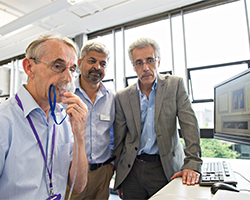28 Aug 2015
Turning breath into words – new device unveiled to give paralysis victims a voice

A new device which transforms paralysis victims’ breath into words – believed to be the first invention of its kind – has been developed by academics from Loughborough University.
Billed as a tool to help bring back the art of conversation for sufferers of severe paralysis and loss of speech, the prototype analyses changes in breathing patterns and converts ‘breath signals’ into words using pattern recognition software and an analogue-to-digital converter. A speech synthesizer then reads the words aloud.
The Augmentative and Alternate Communication (AAC) device is designed for patients with complete or partial loss of voluntary muscle control who don’t have the ability to make purposeful movements such as sniffing or blinking – gestures which previous AAC devices have come to rely upon.
Dr David Kerr, Senior Lecturer in the School of Mechanical and Manufacturing Engineering, and Dr Kaddour Bouazza-Marouf, Reader in Mechatronics in Medicine, said the device learns from its user, building up its knowledge as it goes. It allows the user to control how he or she wishes to communicate – effectively enabling them to create their own language by varying the speed of their breathing. The academics have been joined in the project by Dr Atul Gaur, Consultant Anaesthetist at Glenfield Hospital.
“What we are proposing is a system that learns with the user to form an effective vocabulary that suits the person rather than the machine,” said Dr Kerr.
Read the full press release for more information.














